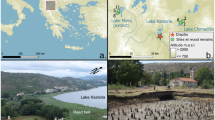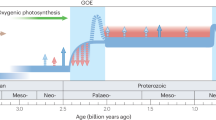Abstract
HOMOGENEOUS isotope exchange is usually investigated by methods in which after a certain time both chemical forms of a given element are separated, specific activities of fractions are measured, and the dependence on time of the exchanged mole fraction is examined. There are many suitable methods of separation, but all have considerable drawbacks—for example, incomplete separation, need for long time intervals for separation during which supplementary exchange can occur, and zero-time exchanges as a result of exchange induced by co-precipitation or separation1.
This is a preview of subscription content, access via your institution
Access options
Subscribe to this journal
Receive 51 print issues and online access
$199.00 per year
only $3.90 per issue
Buy this article
- Purchase on Springer Link
- Instant access to full article PDF
Prices may be subject to local taxes which are calculated during checkout
Similar content being viewed by others
References
Prestwood, R. J., and Wahl, A. C., J. Amer. Chem. Soc., 71, 3137 (1949).
Gosman, A., thesis, Tech. Univ., Prague (1966).
Gosman, A., and Soldatov, E. A., Dokl. Acad. Nauk S.S.S.R., 167, 2, 373 (1966).
Author information
Authors and Affiliations
Rights and permissions
About this article
Cite this article
GOSMAN, A. Investigation of Homogeneous Isotope Exchange by Continuous Measurement of the Self-diffusion Process. Nature 212, 747–748 (1966). https://doi.org/10.1038/212747a0
Issue Date:
DOI: https://doi.org/10.1038/212747a0
Comments
By submitting a comment you agree to abide by our Terms and Community Guidelines. If you find something abusive or that does not comply with our terms or guidelines please flag it as inappropriate.



